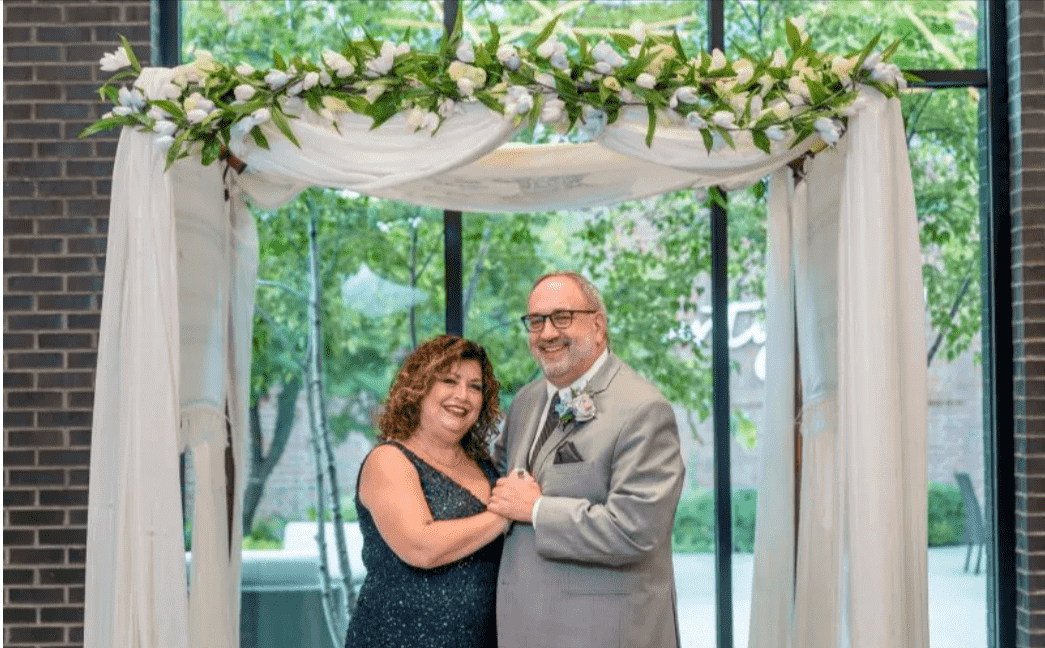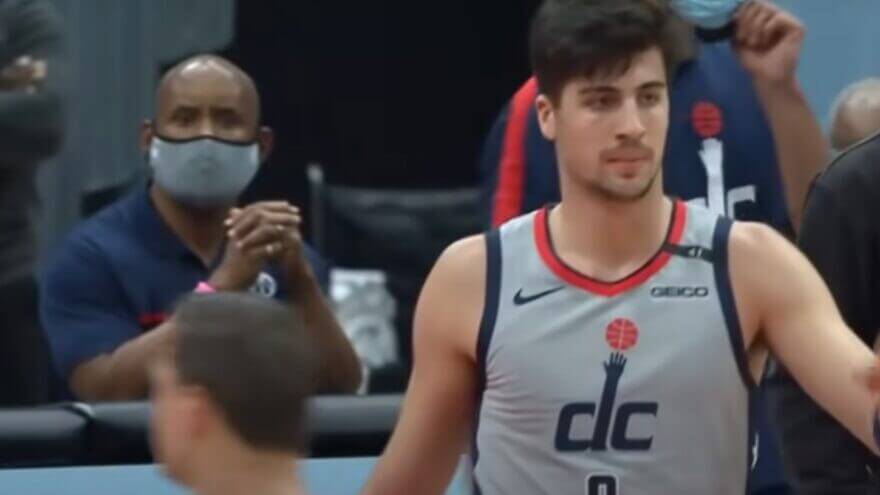Original article On Jewish Times
Even 35 years later, Jonathan and Lisa Pierce cannot agree on all of the details of their unusual first encounter on the campus of Johns Hopkins University in Baltimore that winter day in early February 1988. As Jonathan tells it, the national AEPi fraternity’s “fix it and rebuild it” man arrived on the JHU campus and woke up Lisa at 10:30 a.m. while in pursuit of “the list” of Jewish people on campus.
According to Lisa, she never sleeps that late but had a very good reason to still be doing so on that particular day; she was up until 2:30 a.m. as part of her own sorority pledge event.
The one thing that they can agree on is that their first “date” took place at Shabbat services, and that something magical, life-changing and permanent happened during that visit to campus.
Fast-forward to 2023, and the Pierces are happily married and the parents of three children: Hannah, 28, who got married this past fall to Justin Shaw (they met while working together at the Jewish Federation in Columbus, Ohio); Dan, 26, who is engaged; and Rachel, 22, who graduated college last May. The couple is Jewishly active in their home community of Albany, N.Y., and AEPi has been a continuous thread in their marriage and family life.
After Jonathan graduated college in 1986, he worked as a consultant to the AEPi for two years. The well-known Jewish college fraternity, founded in 1913, boasts 100,000 living alumni and operates chapters on more than 150 college campuses in four countries. “I was mostly helping them start up chapters on the West Coast and some in Florida,” reports Pierce. Then, he received a call from his boss directing him to Baltimore. “He said, ‘Go to Johns Hopkins. The chapter is not doing well and wants to quit.”
At the time, he was living in Ohio and remembers that he had no idea how to get to Baltimore (these were long before the days of Google maps). He was instructed to: “Fly to Newark, rent a car, turn right and go up a hill. The university will be on your left. With those directions and a Thrifty (car rental) map, I got to Baltimore on a Thursday night and stayed at a hotel in Towson.”
Pierce never lost sight of his reason for being in the city in the first place. “The first thing I needed to do to start a chapter was to get a list of Jewish male students on campus. And so I called the Jewish student union president at 10:30 a.m. … and woke her up!” he recounts. “I am on campus restarting AEPi, and I would like a list of Jewish students.”
He recalls not receiving a list of names directly; Lisa Proskin, as she was known at the time, was not permitted to disclose such information. Nevertheless, she invited Pierce to come to Shabbat dinner later that evening, and they met at the KDH (the Kosher Dining Hall).
“We started a friendship and stayed in touch,” recalls Pierce.
That initial friendship continued to grow into more than a friendship — and Jonathan needed to continue making excuses (creating reasons?) to get AEPi to send him to back to Baltimore. “I kept telling them, ‘We are almost ready to restart the chapter. You need to keep sending me there. By then, she and I were going out.”
Piece’s two-year contract with AEPi was ending in the summer of 1988, when he moved to Columbus, Ohio, for law school. “We kept dating and when Lisa graduated, she moved to Columbus for law school, too, and we got married in 1990.”
Their kids followed in their parents’ footstep: All three graduated from The Ohio State University, with their oldest getting her master’s degree from there as well.

A prominent role in their lives
Lisa patiently sat by Jonathon’s side as he recounted their story of meeting (done as part of a Zoom call). Then it was time for her side of the story.
“He did wake me up,” she confirms, “but we had Alpha Phi sorority rush the night before. I was sorority president, and I got to sleep at about 2:30 a.m.”
Lisa recalls meeting in person that Friday before services — at the library.
“I couldn’t give him the list,” she reports, but they found a mutually acceptable way to check the names on a list he had against her master one.
“He asked: ‘What do you do for fun around here?”
And I said: “Go to Shabbat services.”
Lisa brought him to an Orthodox service. “There was a mechitza between us,” she recalls, but this worked to Pierce’s advantage as he was trying to recruit males for the fraternity.
Following Shabbat dinner, the two went to Baltimore’s famous Louie’s Bookstore Café for dessert. They next tried to go to an on-campus party. “I wasn’t 21, and the dean of Greek Life didn’t let me in,” she says.

Lisa recounts that the two were very creative in keeping their relationship going. “He drove a lot and used a lot of frequent-flier miles. And we used AEPi’s 800 number to talk.”
Jonathan and Lisa recall going to Harborplace at the Baltimore waterfront on their first “official” date. They both enjoyed watching the seals outside of the National Aquarium in Baltimore. They enjoyed the spot so much that Jonathan brought her back to in 1989 — to propose!
So many years later, AEPi continues to play a prominent role in their lives. Pierce is past national president; he was installed as Supreme Master in 2001. His firm does public relations for AEPi. Their son was in AEPi at Ohio State. Whenever Pierce sports his AEPi kippah — both in the United States and Israel — he attracts the attention of past and current members. He notes that the fraternity currently has more than 110 chapters in the United States, Canada and the United Kingdom, and that there are six to eight chapters in Israel.
He is also proud of AEPi’s commitment to developing future leaders and to philanthropy: “All of the money we raise goes to Jewish and Israeli causes like Sharsheret and Magen David Adom.”
This past November, Alpha Epsilon Pi International Fraternity celebrated its 109th anniversary with 110 chapters around the world virtually celebrating Shabbat together. During the event, “Shabbat Across AEPi,” chapters from the United States, Canada, Israel and the United Kingdom joined together on two Friday nights (Nov. 4 and Nov. 11) to celebrate the weekly Jewish holiday.
“Bringing so many of our Brothers together virtually to simply say the Shabbat prayers and break bread as one is especially important in our world today,” said Rob Derdiger, AEPi’s CEO. “In light of rising antisemitism on college campuses and in our individual communities, this program makes an important point about being proud of our Jewish heritage and traditions.”
In fact, he said as much in a Dec. 2 opinion piece in the Baltimore Jewish Times titled, “Fighting Back Against Antisemitism on Campus.”
As for the Pierces and their work for the Jewish community, they will never forget how and where their life together started. “I like to say that we met because I was just doing my job,” notes Jonathan. For them, Baltimore will always be Charm City.






